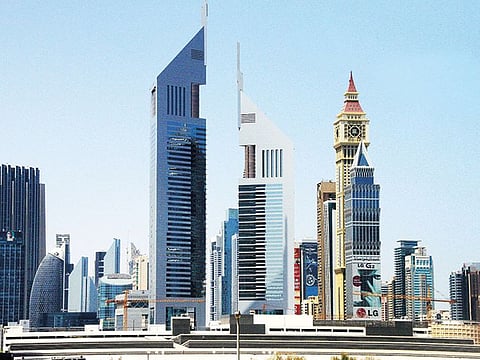UAE’s banks can bridge businesses take up rates on sustainability
Incentivising businesses through credit schemes needs to be done on a war footing

Climate activists are celebrating the most important climate action in US history this week. The landmark bill committing $370 billion to reduce greenhouse emissions positions the country as a global leader in the fight against climate change.
In the UAE we have also demonstrated strong leadership, being the first country in the region to commit to a net zero target by 2050. While our own and the US’s initiatives are legitimate milestones, the climate crisis demands even more urgent action.
It requires us all to examine what we as individuals, communities and businesses can do to quicken the speed of implementation. At Mashreq, we have been working methodically to develop a sustainability framework to define our sustainable lending and financing activities.
Finding the other $500b
That in turn has led us to reflect on the role banks can play in accelerating the UAE’s national drive to net zero. By focusing on three main areas – seeking regulatory intervention, promoting transition-related finance, and aligning the private sector – banks could support and further our country’s leadership towards a sustainable future.
It is estimated that approximately $681 billion will be required by 2050 to transition the UAE to net zero. The UAE Government has already announced bold plans to invest $163 billion in clean and renewable energy over the next 30 years. For the $500+ billion gap, banks will be the key intermediary in channeling the majority of these funds into the economy: their importance cannot be understated in unlocking capital for the climate transition.
But markets, on their own, simply cannot act quickly enough. The most potent levers for transition are held by financial regulators.
The regulatory authorities could greatly influence the lending behavior of commercial banks and thereby push the pace by introducing positive incentives. For example, financial institutions could be required to align their balance-sheets and portfolios to a decarbonization trajectory indirectly influencing businesses.
This will require several steps, including providing a clear direction as to what alignment to the Paris Agreement would entail, strengthening sustainability disclosure requirements, introducing a UAE-focused ‘taxonomy’ of sustainable activities, and incentivizing banks to finance transition-related activities and projects by assigning lower risk weight assets.
Credit incentives
The UAE Government could also accelerate the scaling up of transition-related activities and projects by either directly funding, via dedicated funds, or introducing credit enhancement incentives for investments funded by the banking sector. The tried and tested project finance framework is a financing structure banks know well, and it could be leveraged to scale up renewable energy projects.
A very substantial part of the UAE economy is driven by businesses in the private sector. Unless they embrace the need for change and work alongside the banks, we cannot win this important race. Sustainability/ESG linked credit facilities are a key part of this solution.
European banks already at it
They are on the rise, the world over. Broadly they work by incentivizing borrowers to meet predetermined ‘sustainability performance objectives’. Borrowers are incentivized to achieve targets ahead of time and performance against those targets is used to enhance their sustainability profile, resulting in more favorable lending terms.
This structure has reputational risks for all stakeholders and care is needed to make sure that parties select performance indicators (SPIs) that are materially relevant to the business/industry and targets are set that are truly ambitious. In Europe, nearly 25 per cent of all bank loans, with significant participation from the private sector are now sustainability-linked.
We need to scale up this form of lending for funding to flow through to and reach the most effective projects and entities. Financial institutions are trusted by businesses to provide respected advice to our customers.
With climate and on the transition journey we have a financial and moral imperative to show leadership and customer stewardship. We need to educate both our staff and our stakeholders on the risks - physical, transition, and liability – as well as the opportunities for businesses to manage the transition effectively.
Through formative steps, already Mashreq as the sustainability coordinator, has been involved in the largest Sustainability-linked Loan (SLL) in the region – a $ 2.2 billion facility supporting nogaholding, the energy investment and development arm of the Kingdom of Bahrain.
As we get closer to COP28, we welcome government efforts to advance us towards climate action and a cleaner, more prosperous future. The momentum is with us and I’m personally excited to see the country take on even greater leadership in climate action.
Sign up for the Daily Briefing
Get the latest news and updates straight to your inbox



_US_GOVERNMENT_SHUTDOWN_resources1_16a08546ce2_large.jpg?w=320&auto=format%2Ccompress&fit=max)
